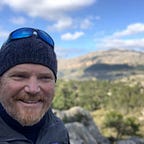Science as intersubjective consensus: participation, agency, & responsibility
“A science of quality is necessarily a first-person science that recognizes values as shared experiences, as states of participative awareness that link us to other organisms with bonds of sympathy, mutual recognition and respect.” — Brian Goodwin, 1994, p.220
There is no such thing as values-free science!
Brian emphasised that objectivity was a social construct based on the intersubjective consensus of people employing a particular way of knowing. Collective interpretation of subjective experiences when employing a certain methodology with a certain focus can build such consensus. The organising idea of a supposedly ‘objective observer’ obscures that being alive is primarily a qualitative experience of subjective participation.
Science can never be fully objective and value-free. We can never escape the responsibility that comes with our agency as subjective participants in the constantly transforming complexity of nested wholeness. As embodied individuals within communities, ecosystems, and a biosphere we intervene in and affect these systems for better or for worse.
“A science of emergent qualities involves a break with the positivist tradition that separates facts and values and a re-establishment of a foundation for a naturalistic ethics. Participation now enters as a fundamental ingredient in the human experience of any phenomenon, which arises out of the encounter between two real processes that are distinct but not separable: the human process of becoming and that of the ‘other’, whatever this may be to which the human is attending. In this encounter wherein the phenomenon is generated, feelings and intuitions are not arbitrary, idiosyncratic accompaniments but directs indicators of the nature of the mutual process that occurs in the encounter. By paying attention to these, we gain insight into the emergent reality in which we participate.” — Peter Reason & Brian Goodwin, 1999
Engaging in a science of qualities means to explore and express “the principles of continuous creativity in natural processes” through direct subjective experience and the “use of intersubjective consensus as a means of distinguishing those aspects of experience and insight that are common to the group from those that are idiosyncratic to individuals” (Goodwin, 2000).
This participatory and holistic approach pays attention to the role of our own subjective experiences and ways of interpreting and meaning-making in what we end up observing as reality. It recognises intersubjective meaning-making as a critical aspect of our agency as participants in the larger systems we are nested in.
One of the most important insights of complexity science, according to Brian, is that we will never be able to “control the processes that underlie the health of organisms, ecosystems, organisations, and communities. They are governed by subtle principles in which causality is not linear but cyclic, cause and effect are not separable and therefore not manipulable. Those systems are the cause and effects of themselves, involving ever increasing loops of mutual dependence” (Goodwin, 2000).
Taking this insight to heart would mean to be much more humble in the way we employ science and technology as means of charting our path into an unpredictable future.
Setting the individual and collective intention to redesign the human presence and impact on Earth within the life time of the generations alive today is audacious indeed.
It is as audacious as it is now urgent to redesign our human impact on Earth so it becomes regenerative and healing rather than degenerative and exploitative.
To make wise choices on that path ahead — a path we have to co-create by walking it together — we need to balance audacity with humility and we need to listen to the wisdom of the whole system revealing itself to us through natural patterns.
—
If you like the post, please clap AND remember that you can clap up to 50 times if you like it a lot ;-)!
Daniel Christian Wahl — Catalyzing transformative innovation in the face of converging crises, advising on regenerative whole systems design, regenerative leadership, and education for regenerative development and bioregional regeneration.
Author of the internationally acclaimed book Designing Regenerative Cultures
